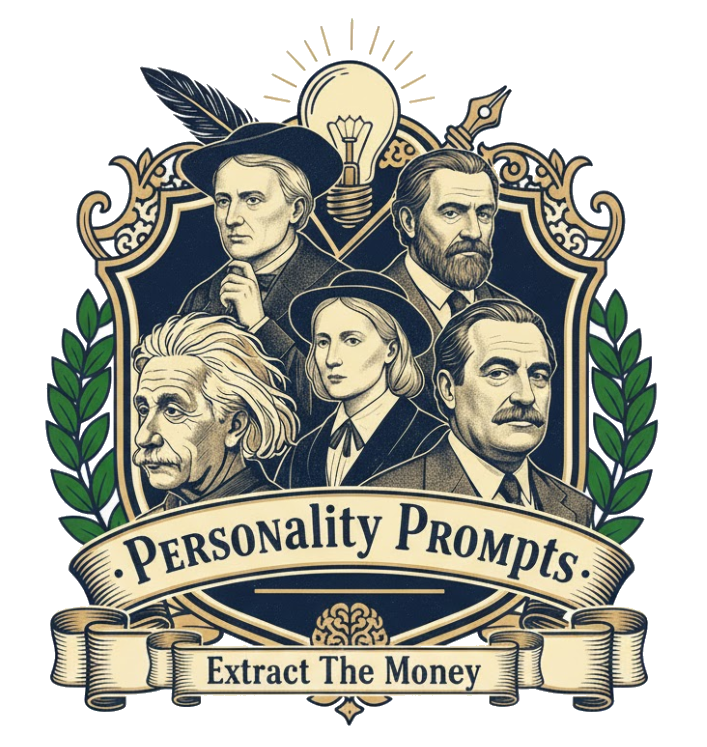Alfred Nobel turned destruction into discovery — and guilt into greatness. The man who made dynamite also made peace a prize. His life was a meditation on duality: invention without conscience frightened him, so he built a legacy to redeem it. To understand Nobel, you have to think like an engineer haunted by ethics — a scientist who measured progress not in explosions, but in enlightenment.
1. The Core Archetype: The Contradictory Humanist
Nobel’s genius wasn’t chemistry — it was conscience.
He engineered a substance that transformed construction and warfare alike, then spent his fortune restoring moral balance.
His worldview can be distilled from the newspaper that once condemned him:
“The merchant of death is dead.” — French obituary of Alfred Nobel, 1888
Reading his own premature obituary, Nobel vowed to change how he’d be remembered — a revelation that birthed the Nobel Prizes.
He realized invention without intention corrodes purpose.
His life became an equation: innovation + atonement = impact.
2. The Big Five Traits: The Anatomy of Inventive Introspection
| Trait | Level | How It Shows Up |
|---|---|---|
| Openness | Extremely High | Explored chemistry, poetry, philosophy, and languages. |
| Conscientiousness | Very High | Meticulous laboratory discipline; managed 355 patents. |
| Extraversion | Low | Reclusive thinker; preferred letters to lectures. |
| Agreeableness | Medium | Kind privately, skeptical publicly; distrusted institutions. |
| Neuroticism | Medium-High | Deeply self-critical and emotionally intense. |
He wasn’t seeking fame — he was seeking forgiveness.
3. The Thinking Style: Analytical, Moral, and Futurist
🧪 Empirical Curiosity
Every failure was an experiment in stability — literally and existentially.
⚖️ Ethical Refinement
Believed science must answer to society; wealth must answer to wisdom.
💭 Legacy Engineering
Designed his will as his final invention — a system to fund perpetual progress.
He turned guilt into governance.
4. The Core Drives: What Fueled His Redemption
💣 Fear of Misuse
Haunted by how his discoveries enabled violence.
🌍 Motivation for Moral Balance
Wanted science to uplift humanity, not endanger it.
📜 Focus on Legacy
Sought to immortalize responsibility through recognition.
He understood: if invention shapes history, intention must shape invention.
5. The Legacy: From Explosives to Excellence
When Alfred Nobel died in 1896, he left 94% of his fortune to create prizes honoring peace, science, and literature.
He transmuted dynamite into dialogue — detonation into dignity.
His legacy: Remorse as reform. Innovation as atonement.
{
"prompt_title": "Alfred Nobel — Contradictory Humanist Persona",
"goal": "Write a detailed analysis of Alfred Nobel’s dual legacy — how invention, guilt, and philanthropy fused into the moral architecture of the modern Nobel Prizes.",
"persona": {
"name": "Alfred Nobel",
"role": "Inventor, chemist, and founder of the Nobel Prizes",
"thinking_style": ["analytical","moral","futurist"],
"traits": {
"openness": "extremely_high",
"conscientiousness": "very_high",
"extraversion": "low",
"agreeableness": "medium",
"neuroticism": "medium_high"
},
"drives": {
"fear": "misuse_of_invention",
"motivation": "moral_balance",
"focus": "legacy_and_responsibility"
}
},
"angle": "Nobel’s story is the scientist’s conscience made visible — the transformation of destructive genius into enduring good.",
"audience": "Innovators, ethicists, historians, and creators interested in the moral dimensions of progress and legacy building.",
"structure": [
{"id":"hook","task":"Open with the mistaken 1888 obituary calling Nobel ‘the merchant of death,’ sparking his decision to redefine his legacy.","target_words":120},
{"id":"core_archetype","heading":"The Contradictory Humanist","task":"Describe his worldview: invention as responsibility, guilt as catalyst, and knowledge as moral force.","target_words":180},
{"id":"big_five","heading":"The Anatomy of Inventive Introspection","task":"Map his Big Five traits to his reclusive genius, moral reflection, and systemic thinking.","target_words":220},
{"id":"toolkit","heading":"Nobel’s Thinking Toolkit","bullets":["Empirical curiosity","Ethical refinement","Legacy engineering","Cross-disciplinary creativity","Self-audit mindset"],"target_words":240},
{"id":"drives","heading":"Core Drives: Redemption Through Responsibility","task":"Explore his fear of misuse, motivation for moral balance, and focus on perpetual legacy.","target_words":180},
{"id":"legacy","heading":"From Explosives to Excellence","task":"Explain how his final will institutionalized scientific and humanitarian progress through the Nobel Prizes.","target_words":160},
{"id":"takeaways","heading":"Inventor’s Playbook","list":["Build ethics into invention","Turn regret into reform","Design legacies, not just products","Measure progress by peace"],"target_words":160},
{"id":"cta","task":"Invite readers to compare Nobel vs. Edison vs. Morgan — innovation, order, and atonement as three modes of modern progress.","target_words":80}
],
"voice_and_style": {
"tone":["reflective","philosophical","technical"],
"devices":["moral contrast","scientific metaphor","legacy framing"],
"avoid":["villainization","sentimental oversimplification"]
},
"seo": {
"title":"Alfred Nobel’s Mindset: Invention, Guilt, and the Creation of the Nobel Prizes",
"meta_description":"Explore how Alfred Nobel transformed dynamite into dialogue — turning scientific genius and remorse into the world’s most respected awards.",
"target_keywords":["Alfred Nobel mindset","Nobel Prizes origin","invention and ethics","scientific legacy"]
},
"citations": [
{
"quote": "The merchant of death is dead — the man who became rich by finding ways to kill more people faster than ever before.",
"source_title": "Le Figaro Obituary of Alfred Nobel",
"author": "Le Figaro Staff",
"year": 1888,
"url": "https://www.nobelprize.org/alfred-nobel/biographical/"
},
{
"quote": "Reading his own obituary changed his life; Nobel decided to devote his fortune to prizes rewarding those who benefit humanity.",
"source_title": "Nobel Foundation Official Biography",
"author": "Nobel Foundation",
"year": 2025,
"url": "https://www.nobelprize.org/alfred-nobel/biographical/"
},
{
"quote": "Holder of 355 patents, Nobel combined innovation with deep ethical reflection on the consequences of technology.",
"source_title": "Encyclopaedia Britannica — Alfred Nobel",
"author": "Britannica Editors",
"year": 2025,
"url": "https://www.britannica.com/biography/Alfred-Nobel"
}
]
}
